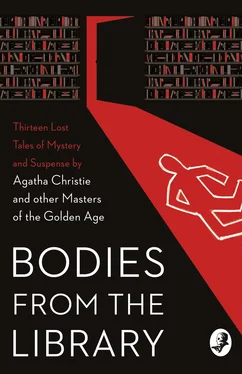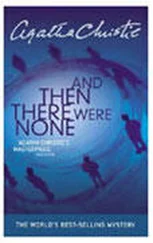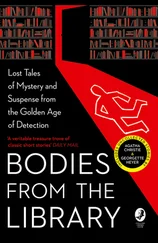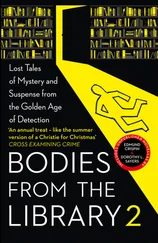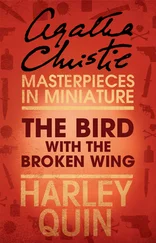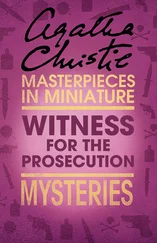‘And if he didn’t?’ queried Sir Clinton.
‘Then the money went to a lot of charities,’ Wendover explained. ‘That’s just the trouble, as you’ll see. Three years ago, young Robin took diabetes, a bad case, poor fellow. We did what we could for him, naturally. All the specialists had a turn, without improvement. Then we sent him over to Neuenahr, to some institute run by a German who specialised in diabetes. No good. I went over to see the poor boy, and he was worn to a shadow, simply skin and bone and hardly able to walk with weakness. Obviously it was a mere matter of time.’
‘Hard lines on the youngster,’ Sir Clinton commented soberly.
‘Very hard,’ said Wendover with a gesture of pity. ‘Now as it happened, at Neuenahr he scraped acquaintance with a French doctor. I saw him when I was there: about thirty, black torpedo beard, very brisk and well-got-up, with any amount of belief in himself. He spoke English fluently, which gave him a pull with Robin, out there among foreigners; and he persuaded the boy that he could cure him if he would put himself in his charge. Well, by that time, it seemed that any chance was worth taking, so I agreed. After all, the boy was dying by inches. So off he went to the south of France, where this man—Prevost, his name was—had a nursing home of his own. I saw the place: well-kept affair though small. And he had an English nurse, which was lucky for Robin. Pretty girl she was: chestnut hair, creamy skin, supple figure, neat hands and feet. A lady, too.’
‘Oh, any pretty girl can get round you,’ interjected Sir Clinton. ‘Get on with the tale.’
‘Well, it was all no good,’ Wendover went on, hastily. ‘The poor boy went downhill in spite of all the Frenchman’s talk; and, to cut a long story short, he died a fortnight ago, on the very day when he came of age.’
‘Oh, so he lived long enough to inherit?’
‘By the skin of his teeth,’ Wendover agreed. ‘That’s where the trouble begins. Before that day, of course, he could make no valid will. But now a claimant, one Sydney Eastcote, turns up with the claim that Robin made a will the morning of the day he died, and by this will this Eastcote scoops the whole estate. All I know of it is from a letter this Eastcote wrote to me giving the facts. I referred him to the lawyer for the estate and told the lawyer—Harringay’s his name—to bring the claimant here this afternoon. They’re due now. I’d like you to look him over, Clinton. I’m not quite satisfied about this will.’
The Chief Constable pondered for a moment or two.
‘Very well,’ he agreed. ‘But you’d better not introduce me as Sir Clinton Driffield, Chief Constable, etc. I’d better be Mr Clinton, I think. It sounds better for a private confabulation.’
‘Very well,’ Wendover conceded. ‘There’s a car on the drive. It must be they, I suppose.’
In a few moments the door opened and the visitors were ushered in. Surprised himself, the Chief Constable was still able to enjoy the astonishment of his friend; for instead of the expected man, a pretty chestnut-haired girl, dressed in mourning, was shown into the room along with the solicitor, and it was plain enough that Wendover recognised her.
‘You seem surprised, Mr Wendover,’ the girl began, evidently somewhat taken aback by Wendover’s expression. Then she smiled as though an explanation occurred to her. ‘Of course, it’s my name again. People always forget that Sydney’s a girl’s name as well as a man’s. But you remember me, don’t you? I met you when you visited poor Robin.’
‘Of course I remember you, Nurse,’ Wendover declared, recovering from his surprise. ‘But I never heard you called anything but “Nurse” and didn’t even hear your surname; so naturally I didn’t associate you with the letter I got about poor Robin’s will.’
‘Oh, I see,’ answered the girl. ‘That accounts for it.’
She looked inquiringly towards the Chief Constable, and Wendover recovered his presence of mind.
‘This is a friend of mine, Mr Clinton,’ he explained. ‘Miss Eastcote. Mr Harringay. Won’t you sit down? I must admit your letter took me completely by surprise, Miss Eastcote.’
Wendover was getting over his initial astonishment at the identity of the claimant, and when they had all seated themselves, he took the lead.
‘I’ve seen a copy of Robin’s death certificate,’ he began slowly. ‘He died in the afternoon of September 21st, the day he came of age, so he was quite competent to make a will. I suppose he was mentally fit to make one?’
‘Dr Prevost will certify that if necessary,’ the nurse affirmed quietly.
‘I noticed that he didn’t die in Dr Prevost’s Institute,’ Wendover continued. ‘At some local hotel, wasn’t it?’
‘Yes,’ Nurse Eastcote confirmed. ‘A patient died in the Institute about that time and poor Robin hated the place on that account. It depressed him, and he insisted on moving to the hotel for a time.’
‘He must have been at death’s door then, poor fellow,’ Wendover commented.
‘Yes,’ the nurse admitted, sadly. ‘He was very far through. He had lapses of consciousness, the usual diabetic coma. But while he was awake he was perfectly sound mentally, if that’s what you mean.’
Wendover nodded as though this satisfied him completely.
‘Tell me about this will,’ he asked. ‘It’s come as something of a surprise to me, not unnaturally.’
Nurse Eastcote hesitated for a moment. Her lip quivered and her eyes filled with tears as she drew from her bag an envelope of thin foreign paper. From this she extracted a sheet of foreign notepaper which she passed across to Wendover.
‘I can’t grumble if you’re surprised at his leaving me this money,’ she said, at last. ‘I didn’t expect anything of the kind myself. But the fact is … he fell in love with me, poor boy, while he was under my charge. You see, except for Dr Prevost, I was the only one who could speak English with him, and that meant much to him at that time when he was so lonely. Of course he was much younger that I am; I’m twenty-seven. I suppose I ought to have checked him when I saw how things were. But I hadn’t the heart to do it. It was something that gave him just the necessary spur to keep him going, and of course I knew that marriage would never come into it. It did no harm to let him fall in love; and I really did my very best to make him happy, in these last weeks. I was so sorry for him, you know.’
This put the matter in a fresh light for Wendover, and he grew more sympathetic in his manner.
‘I can understand,’ he said gently. ‘You didn’t care for him, of course …’
‘Not in that way. But I was very very sorry for him, and I’d have done anything to make him feel happier. It was so dreadful to see him going out into the dark before he’d really started in life.’
Wendover cleared his throat, evidently conscious that the talk was hardly on the businesslike lines which he had planned. He unfolded the thin sheet of notepaper and glanced over the writing.
‘This seems explicit enough. “I leave all that I have to Nurse Sydney Eastcote, residing at Dr Prevost’s medical Institute.” I recognise the handwriting as Robin’s, and the date is in the same writing. Who are the witnesses, by the way?’
‘Two of the waiters at the hotel, I believe,’ Nurse Eastcote explained.
Wendover turned to the flimsy foreign envelope and examined the address.
‘Addressed by himself to you at the institute, I see. And the postmark is 21st September. That’s quite good confirmatory evidence, if anything of the sort were needed.’
He passed the two papers to Sir Clinton. The Chief Constable seemed to find the light insufficient where he was sitting, for he rose and walked over to a window to examine the documents. This brought him slightly behind Nurse Eastcote. Wendover noted idly that Sir Clinton stood sideways to the light while he inspected the papers in his hand.
Читать дальше
